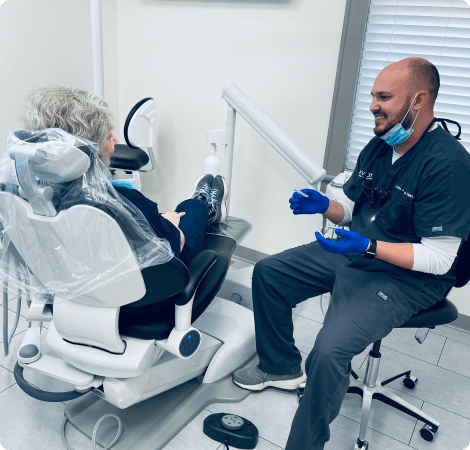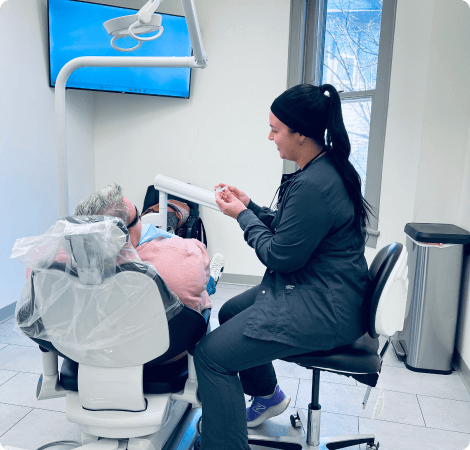Evaluating the Benefits of Dental Implants

Let’s address the elephant in the room: yes, dental implants are expensive. The materials and processes used to craft them, not to mention the resources required for the dentist to implant them, can add up really quickly. According to one recent estimate,they can cost between USD$3,000 and USD$4,500 per tooth.
Such a price tag alone is enough to discourage people who need them from getting one, instead opting to live the rest of their lives with missing teeth—if not no teeth at all.
On the other side of the debate, quality dental implants are your best bet in maintaining a full set of teeth throughout your life. Once you lose your permanent teeth, whether to trauma or oral disease, no replacement will grow in their places. Furthermore, missing teeth run the risk of the gums degrading, bone loss in the area of the missing tooth, and adjacent teeth will be more prone to dental caries.
In this blog post, we’ll weigh the cost of dental implants in New Albany dental clinics
relative to the health benefits they bring. Will spending thousands of dollars on one or
several dental implants be worth the investment?
The Structure of a Dental Implant
A major reason for the hefty cost of dental implants can be found in their structure,namely in the materials used. A typical implant consists of three main parts: the implant,the crown, and the abutment in between.
The implant serves as the root holding the entire system in place. Its grooves are designed to help the bone grow around the screw, giving the crown and abutment a solid foundation. But as you know, introducing a foreign substance to living tissue like the gums can trigger an inflammatory response. As such, apart from being resilient, the implant must also be “biocompatible.”
Enter titanium, a relatively rare metal often associated with strength but also compatibility with organic tissues. Most implants are either made out of titanium or one of its many alloys, with alloying metals such as aluminum, molybdenum, niobium,vanadium, and zirconium.
Titanium isn’t as abundant as aluminium or iron, only comprising 0.5% of the mass of the Earth’s crust, making it a costly material. Some alloying metals like vanadium are much less scarce, adding to the final price tag.
Nevertheless, a titanium dental implant is less likely to trigger a foreign body response and corrode in the long term. Thanks to the metal’s impressive properties, a titanium implant has a success rate of up to 95% over a decade from implantation. Combined with proper dental care and hygiene, they can last a lifetime.
The Cost of Permanent Tooth Loss
It might seem that you can save thousands by simply bearing the brunt of life with a single missing tooth or a couple of teeth lost. However, it’s also important to consider the loss in quality of life brought about by tooth loss—and also the cost.
Teeth serve a crucial role in the body’s overall function: breaking down food for the body to digest and absorb. Each tooth lost to trauma or disease undermines the entire set’s ability to perform such a function. Losing enough teeth can drastically alter your life in a myriad of respects, from diet to social interaction.

A growing number of studies have also suggested a link between tooth loss and depression or anxiety. In one study of roughly 170,000 participants, researchers discovered that losing ten teeth or more can induce the same depressive effect as a major depressive disorder that isn’t treated with antidepressants.
But fine, let’s stick to the dental side of things; this is a dental clinic’s blog, after all.Gaps between healthy teeth can put them at risk of, as mentioned earlier, gum disease.At this point, gums are prone to plaque buildup and bacterial infection, leading to major gum loss. The teeth will bear the brunt of the side effects, creating a costly vicious cycle.
We can continue talking about other effects of having missing teeth, but at this point, the cost of treatment for its side effects has basically surpassed the cost of dental implants (including other associated costs).
For example, a study in 2022 assessed the mean yearly cost of treating a major depressive disorder to be a little over USD$10,000. With dental implants, assuming they don’t fail too soon, the patient only pays the one-time cost of the teeth implants and the procedure. The long-term costs are associated with routine dental examinations and cleaning.
Partial Dental Implant Coverage
Dental implants are too costly for insurance companies to cover fully, given the staggering number of Americans who lose their teeth every year. However, some dental insurance plans can provide partial coverage. The amount ranges between 10 and 50% of the implant and crown cost, though some policies also cover dental procedures.
Still, many of these plans come with a capped amount. If your dental implant policy can pay for 50% of a USD$4,000 implant (post-deductibles), but the cap is set at USD$1,000, you can still end up paying 75% of the dental implant costs. Then again,partially paying for a tooth implant is still better than paying every cent of it.
Another downside is the long waiting period, which is designed to prevent policyholders with pre-existing conditions from using the policy right after purchase. Depending on the policy, the period can range between 6 months and 1.5 years. As a major dental surgery, a dental implant is subject to this wait time.
If you don’t have a dental insurance policy or don’t plan to get one anytime soon, there are other tooth replacement options. Experts say that health insurance policyholders may invoke their coverage of dental implants (if it’s covered at all) if the tooth loss is a result of a medical condition (e.g., oral cancer). Alternatively, you can work out a payment plan with your dentist.
The Verdict
So, are dental implants worth the hefty price tag?
No matter how you look at it, they’re still more cost-effective in the long run than leaving gaps in teeth at the mercy of infections and other dental problems. They can help keep your remaining teeth working as usual and preserve much-needed self-esteem when in public, both of which contribute to your oral health and overall well-being.
That said, if you’re looking to avoid spending thousands upfront for quality dental implants, your best bet will be to practice proper oral hygiene. That way, you can lower your risk of losing teeth prematurely.






